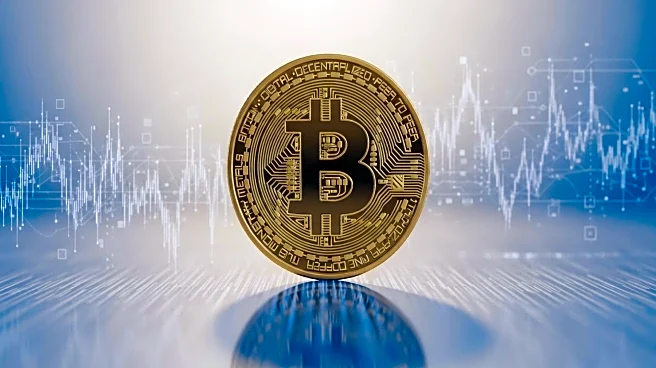What's Happening?
Bitcoin's recent market volatility has sparked debate over its sustainability as a corporate treasury asset. On September 4, 2025, Bitcoin's price fell below $110,000, continuing its pullback from an all-time high of $123,640 in August. Analysts from Bitfinex noted that Bitcoin is in its third consecutive week of retracement, with historical corrections averaging around 17%. The cryptocurrency could test a potential floor between $93,000 and $95,000 if current trends persist. Meanwhile, LMAX Group's market strategist Joel Kruger suggests the correction might be shallower if ETF inflows, corporate treasury allocations, and favorable regulatory developments occur. The debate is further fueled by high-profile corporate entries into the space, such as American Bitcoin, a Trump family-backed firm, which is leveraging connections for power deals and pursuing a hybrid model combining mining with strategic Bitcoin accumulation.
Why It's Important?
Bitcoin's role as a treasury asset is significant for institutional investors and corporations seeking stable value storage. Its finite supply and predictable issuance make it a reliable store of value, contrasting with altcoins that often undergo frequent protocol changes and rely on speculative narratives. As companies like CleanCore Solutions and Bit Digital launch digital asset treasury strategies, the risks of allocating corporate capital to altcoins become apparent, with some firms experiencing significant declines in value. Bitcoin's structural advantages may ensure its continued dominance, providing a non-sovereign, finite, and battle-tested monetary asset for companies aiming to future-proof their capital structures.
What's Next?
The future of Bitcoin as a corporate treasury asset may depend on regulatory developments and market conditions. If ETF inflows and corporate treasury allocations increase, Bitcoin's correction could be less severe. American Bitcoin's success will likely hinge on securing low-cost energy and navigating regulatory hurdles in the mining sector. As the digital asset landscape evolves, Bitcoin's acceptance by institutional investors and corporations may continue to grow, reinforcing its position as a strategic reserve asset.
Beyond the Headlines
The ethical and regulatory dimensions of Bitcoin's use in corporate treasuries are complex. While Bitcoin offers stability, its energy-intensive mining process raises environmental concerns. Companies must balance the benefits of Bitcoin's monetary properties with the potential environmental impact and regulatory scrutiny. The debate over Bitcoin versus altcoins also highlights broader questions about the future of digital assets and their role in corporate finance.









